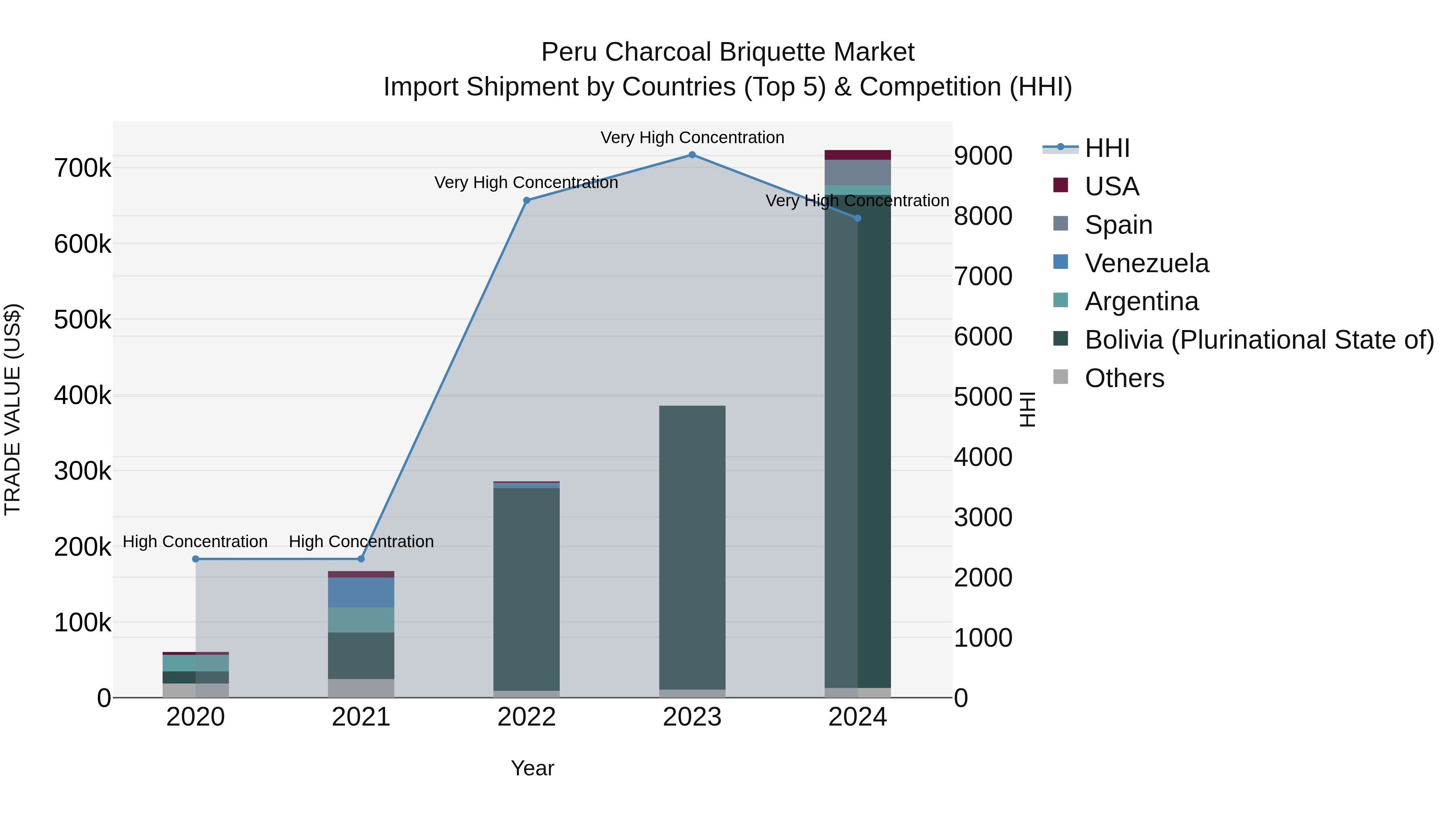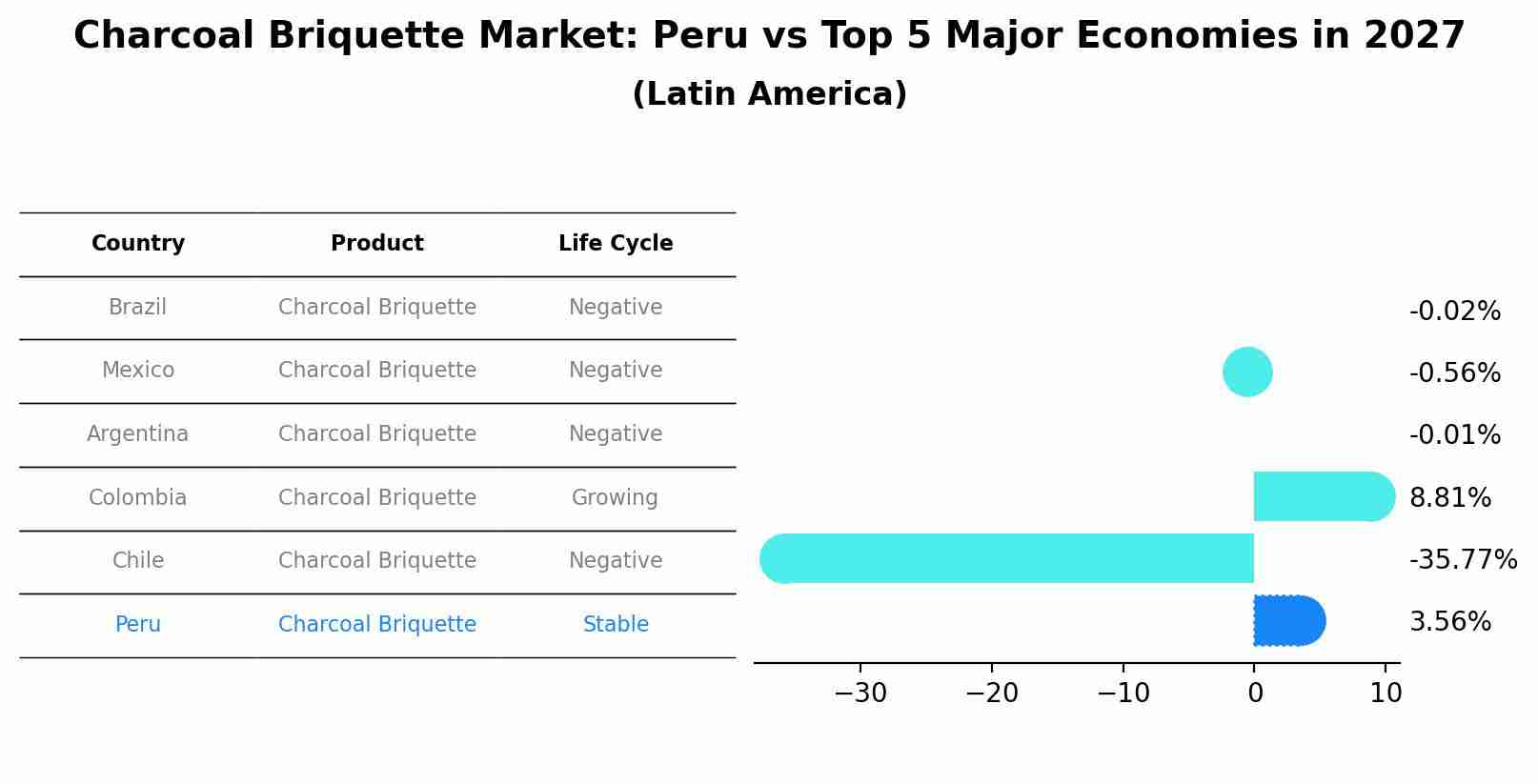Peru Charcoal Briquette Market (2025-2031) Outlook | Analysis, Value, Revenue, Companies, Size, Trends, Share, Forecast, Industry & Growth
| Product Code: ETC286506 | Publication Date: Aug 2022 | Updated Date: Nov 2025 | Product Type: Market Research Report | |
| Publisher: 6Wresearch | Author: Ravi Bhandari | No. of Pages: 75 | No. of Figures: 35 | No. of Tables: 20 |
Peru Charcoal Briquette Market Top 5 Importing Countries and Market Competition (HHI) Analysis
Peru`s charcoal briquette import market continued to showcase strong growth in 2024, with top exporting countries being Bolivia, Spain, USA, Argentina, and Netherlands. The high Herfindahl-Hirschman Index (HHI) indicates a concentrated market structure. The impressive compound annual growth rate (CAGR) of 86.23% from 2020 to 2024 reflects the increasing demand for charcoal briquettes in Peru. The growth rate of 87.59% from 2023 to 2024 further underscores the market`s momentum and potential for continued expansion in the coming years.

Charcoal Briquette Market: Peru vs Top 5 Major Economies in 2027 (Latin America)
By 2027, Peru's Charcoal Briquette market is forecasted to achieve a stable growth rate of 3.56%, with Brazil leading the Latin America region, followed by Mexico, Argentina, Colombia and Chile.

Peru Charcoal Briquette Market Overview
The Peru charcoal briquette market is experiencing steady growth driven by increasing demand for environmentally friendly and sustainable fuel options. The market is characterized by the presence of both local and international manufacturers offering a variety of charcoal briquette products. Consumers are increasingly choosing charcoal briquettes over traditional charcoal due to their longer burning time, higher heat output, and lower smoke emissions. The market is also benefiting from the rising popularity of outdoor cooking activities and the growing awareness of the environmental impact of traditional charcoal production. Key players in the Peru charcoal briquette market are focusing on product innovation, quality improvements, and expanding distribution channels to cater to the evolving consumer preferences and to capitalize on the expanding market opportunities.
Peru Charcoal Briquette Market Trends
The Peru charcoal briquette market is experiencing a shift towards sustainable and environmentally-friendly products, driven by increasing awareness of deforestation and carbon emissions. Consumers are seeking charcoal briquettes made from renewable sources such as coconut shells or sawdust, as well as those that are produced using eco-friendly manufacturing processes. Additionally, there is a growing demand for charcoal briquettes that offer longer burning times and higher heat efficiency for grilling and cooking purposes. Manufacturers in the market are focusing on product innovation to meet these evolving consumer preferences, such as introducing smokeless charcoal briquettes or those infused with natural flavors. Overall, the Peru charcoal briquette market is moving towards sustainable practices and high-quality products to cater to the environmentally-conscious consumer base.
Peru Charcoal Briquette Market Challenges
In the Peru charcoal briquette market, challenges arise primarily from competition with traditional charcoal methods and the lack of awareness among consumers regarding the benefits of charcoal briquettes. Additionally, issues related to access to raw materials and the high cost of production can hinder market growth. Environmental concerns and regulations around deforestation and carbon emissions further impact the industry. Distribution and marketing strategies also pose challenges, as reaching rural areas where charcoal is commonly used can be difficult. Overall, overcoming these challenges requires educating consumers about the advantages of charcoal briquettes, improving production efficiency, addressing environmental sustainability concerns, and developing effective distribution channels to penetrate the market effectively.
Peru Charcoal Briquette Market Investment Opportunities
Investment opportunities in the Peru charcoal briquette market are promising due to the increasing demand for sustainable and eco-friendly fuel sources. With the country`s rich biodiversity and forestry resources, there is a potential for growth in the production and export of charcoal briquettes. Investors could consider opportunities in establishing manufacturing facilities, developing innovative production techniques to improve efficiency and sustainability, as well as investing in marketing and distribution channels to reach both local and international markets. Additionally, partnerships with local communities and sustainable forestry initiatives could enhance the sustainability and social impact of such investments. Overall, the Peru charcoal briquette market offers potential for growth and a chance to contribute to environmental conservation efforts while meeting the rising demand for clean energy alternatives.
Peru Charcoal Briquette Market Government Policy
In Peru, government policies related to the charcoal briquette market primarily focus on promoting sustainable production practices and reducing deforestation. The Ministry of Agriculture and Irrigation has implemented programs to support small-scale charcoal producers in adopting efficient and environmentally-friendly production methods. Additionally, there are regulations in place to ensure that charcoal production is carried out in compliance with environmental standards, aiming to protect the country`s forests and biodiversity. The government also encourages the use of charcoal briquettes as an alternative to traditional charcoal, promoting energy efficiency and reducing emissions. Overall, Peru`s policies aim to balance economic development with environmental conservation in the charcoal briquette market.
Peru Charcoal Briquette Market Future Outlook
The Peru Charcoal Briquette Market is expected to witness steady growth in the coming years due to increasing environmental awareness and the rising demand for sustainable fuel sources. With a growing focus on reducing deforestation and promoting eco-friendly alternatives, charcoal briquettes are gaining popularity as a cleaner and more efficient fuel option. The market is likely to benefit from ongoing efforts to improve production techniques, enhance product quality, and expand distribution channels. Additionally, the rising disposable income and changing consumer preferences towards cleaner cooking solutions are projected to drive the demand for charcoal briquettes in Peru. Overall, the market is poised for growth as manufacturers continue to innovate and cater to the evolving needs of environmentally conscious consumers.
Key Highlights of the Report:
- Peru Charcoal Briquette Market Outlook
- Market Size of Peru Charcoal Briquette Market, 2024
- Forecast of Peru Charcoal Briquette Market, 2031
- Historical Data and Forecast of Peru Charcoal Briquette Revenues & Volume for the Period 2021 - 2031
- Peru Charcoal Briquette Market Trend Evolution
- Peru Charcoal Briquette Market Drivers and Challenges
- Peru Charcoal Briquette Price Trends
- Peru Charcoal Briquette Porter's Five Forces
- Peru Charcoal Briquette Industry Life Cycle
- Historical Data and Forecast of Peru Charcoal Briquette Market Revenues & Volume By Type for the Period 2021 - 2031
- Historical Data and Forecast of Peru Charcoal Briquette Market Revenues & Volume By Wood Type for the Period 2021 - 2031
- Historical Data and Forecast of Peru Charcoal Briquette Market Revenues & Volume By Others for the Period 2021 - 2031
- Historical Data and Forecast of Peru Charcoal Briquette Market Revenues & Volume By Application for the Period 2021 - 2031
- Historical Data and Forecast of Peru Charcoal Briquette Market Revenues & Volume By Metallurgical Industry for the Period 2021 - 2031
- Historical Data and Forecast of Peru Charcoal Briquette Market Revenues & Volume By BBQ for the Period 2021 - 2031
- Historical Data and Forecast of Peru Charcoal Briquette Market Revenues & Volume By Others for the Period 2021 - 2031
- Peru Charcoal Briquette Import Export Trade Statistics
- Market Opportunity Assessment By Type
- Market Opportunity Assessment By Application
- Peru Charcoal Briquette Top Companies Market Share
- Peru Charcoal Briquette Competitive Benchmarking By Technical and Operational Parameters
- Peru Charcoal Briquette Company Profiles
- Peru Charcoal Briquette Key Strategic Recommendations
Frequently Asked Questions About the Market Study (FAQs):
- Single User License$ 1,995
- Department License$ 2,400
- Site License$ 3,120
- Global License$ 3,795
Search
Thought Leadership and Analyst Meet
Our Clients
Related Reports
- Canada Oil and Gas Market (2026-2032) | Share, Segmentation, Value, Industry, Trends, Forecast, Analysis, Size & Revenue, Growth, Competitive Landscape, Outlook, Companies
- Germany Breakfast Food Market (2026-2032) | Industry, Share, Growth, Size, Companies, Value, Analysis, Revenue, Trends, Forecast & Outlook
- Australia Briquette Market (2025-2031) | Growth, Size, Revenue, Forecast, Analysis, Trends, Value, Share, Industry & Companies
- Vietnam System Integrator Market (2025-2031) | Size, Companies, Analysis, Industry, Value, Forecast, Growth, Trends, Revenue & Share
- ASEAN and Thailand Brain Health Supplements Market (2025-2031) | Strategy, Consumer Insights, Analysis, Investment Trends, Opportunities, Growth, Size, Share, Industry, Revenue, Segments, Value, Segmentation, Supply, Forecast, Restraints, Outlook, Competition, Drivers, Trends, Demand, Pricing Analysis, Competitive, Strategic Insights, Companies, Challenges
- ASEAN Bearings Market (2025-2031) | Strategy, Consumer Insights, Analysis, Investment Trends, Opportunities, Growth, Size, Share, Industry, Revenue, Segments, Value, Segmentation, Supply, Forecast, Restraints, Outlook, Competition, Drivers, Trends, Demand, Pricing Analysis, Competitive, Strategic Insights, Companies, Challenges
- Europe Flooring Market (2025-2031) | Outlook, Share, Industry, Trends, Forecast, Companies, Revenue, Size, Analysis, Growth & Value
- Saudi Arabia Manlift Market (2025-2031) | Outlook, Size, Growth, Trends, Companies, Industry, Revenue, Value, Share, Forecast & Analysis
- Uganda Excavator, Crane, and Wheel Loaders Market (2025-2031) | Strategy, Consumer Insights, Analysis, Investment Trends, Opportunities, Growth, Size, Share, Industry, Revenue, Segments, Value, Segmentation, Supply, Forecast, Restraints, Outlook, Competition, Drivers, Trends, Demand, Pricing Analysis, Competitive, Strategic Insights, Companies, Challenges
- Rwanda Excavator, Crane, and Wheel Loaders Market (2025-2031) | Strategy, Consumer Insights, Analysis, Investment Trends, Opportunities, Growth, Size, Share, Industry, Revenue, Segments, Value, Segmentation, Supply, Forecast, Restraints, Outlook, Competition, Drivers, Trends, Demand, Pricing Analysis, Competitive, Strategic Insights, Companies, Challenges
Industry Events and Analyst Meet
Whitepaper
- Middle East & Africa Commercial Security Market Click here to view more.
- Middle East & Africa Fire Safety Systems & Equipment Market Click here to view more.
- GCC Drone Market Click here to view more.
- Middle East Lighting Fixture Market Click here to view more.
- GCC Physical & Perimeter Security Market Click here to view more.
6WResearch In News
- Doha a strategic location for EV manufacturing hub: IPA Qatar
- Demand for luxury TVs surging in the GCC, says Samsung
- Empowering Growth: The Thriving Journey of Bangladesh’s Cable Industry
- Demand for luxury TVs surging in the GCC, says Samsung
- Video call with a traditional healer? Once unthinkable, it’s now common in South Africa
- Intelligent Buildings To Smooth GCC’s Path To Net Zero


















